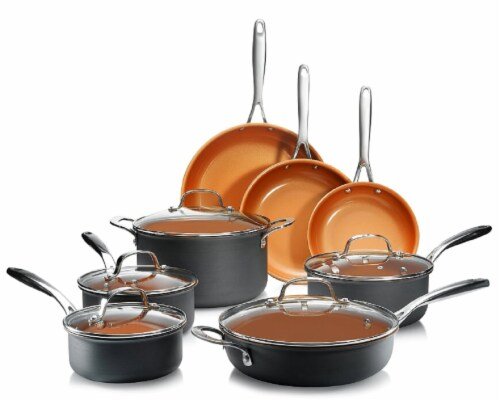Introduction
Cooking enthusiasts often seek high-quality cookware with durability, excellent heat conductivity, and nonstick properties. Hard anodized cookware has gained significant popularity recently due to its exceptional performance and longevity. However, properly seasoning your hard anodized cookware is crucial to maximize its lifespan and maintain its nonstick surface. This comprehensive guide will explore the step-by-step process of How to Season hard anodized cookware and its benefits and answer frequently asked questions related to this topic.
How to Season Hard Anodized Cookware
Seasoning hard anodized cookware is a simple yet essential process that involves treating the surface with a thin layer of oil or fat to enhance its nonstick properties and prevent food from sticking. Let’s dive into the detailed steps to effectively season your hard anodized cookware.
Step 1: Clean the Cookware
Before beginning the seasoning process:
- Ensure your hard anodized cookware is clean and free from food residue or stains.
- Wash it thoroughly with warm water and mild dish soap, using a soft sponge or cloth to avoid scratching the surface.
- Rinse the cookware thoroughly and pat it dry with a clean towel.
Step 2: Apply Cooking Oil
Once your hard anodized cookware is clean and dry, it’s time to apply a thin layer of cooking oil. Use a high-smoke-point oil such as vegetable, canola, or grapeseed. Pour a small amount of oil onto a paper towel or cloth and rub it all over the interior and exterior surfaces of the cookware.
Step 3: Heat the Cookware
After applying the oil, place the seasoned cookware on the stove over medium heat. Allow it to heat for about 2-3 minutes or until you see a light smoke. Heating the cookware helps the oil bond with the surface, creating a protective layer.
Step 4: Cool and Wipe Off Excess Oil
Once the cookware has heated, turn off the heat and let it cool naturally. Once it has cooled down, use a clean cloth or paper towel to remove excess oil. This step ensures that only a thin layer of oil remains on the surface, preventing it from becoming sticky.
Step 5: Repeat the Process
To achieve the best results, it’s recommended to repeat the seasoning process 2-3 times. This helps build up a stronger nonstick layer on the cookware. After each seasoning, wipe off any excess oil and allow the cookware to cool completely before proceeding with the next round.
The Benefits of Seasoning Hard Anodized Cookware
Seasoning your hard anodized cookware offers a range of benefits that enhance your cooking experience. Let’s explore the advantages of seasoning your cookware.
- Improved Nonstick Properties: Seasoning creates a natural nonstick surface on your hard anodized cookware, allowing food to glide effortlessly without sticking. This makes cooking and cleaning much easier.
- Enhanced Durability: Seasoning helps to protect the cookware’s surface from scratches and extends its lifespan. The oil forms a protective barrier that prevents metal utensils from directly contacting the hard anodized coating.
- Even Heat Distribution: The seasoning process fills in any microscopic pores on the cookware’s surface, resulting in improved heat distribution. This ensures that your food cooks evenly without hot spots.
- Reduced Oil Usage: A well-seasoned hard anodized pan requires less oil or fat for cooking, making your meals healthier while still achieving the desired nonstick effect.
- Easy Cleaning: Seasoning minimizes food buildup and makes cleaning a breeze. You’ll spend less time scrubbing and more time enjoying your delicious creations.
FAQs (Frequently Asked Questions)
Q: How often should I season my hard anodized cookware?
A: Seasoning your hard anodized cookware every 3-4 months or as needed is recommended. Regular seasoning helps to maintain its nonstick properties and prolong its lifespan.
Q: Can I use any type of oil for seasoning?
A: While high-smoke-point oils like vegetable oil, canola oil, and grapeseed oil are commonly used for seasoning, you can experiment with other oils as long as they have a high smoke point. Avoid using low-smoke-point oils such as olive oil, as they can leave a sticky residue on the surface.
Q: Can I season my hard anodized cookware in the oven?
A: No, seasoning hard anodized cookware in the oven is not recommended. Seasoning is best done on the stovetop to control the heat and prevent excessive smoking.
Q: Should I season both the interior and exterior of the cookware?
A: It is advisable to season your hard anodized cookware’s interior and exterior surfaces. This ensures comprehensive protection and nonstick performance.
Q: Can I use metal utensils on seasoned hard anodized cookware?
A: While hard anodized cookware is generally more resistant to scratching, it is still best to use non-metal utensils to preserve the seasoning layer and avoid potential damage.
Q: Can I use soap to clean my seasoned hard anodized cookware?
A: You can use mild dish soap to clean your seasoned hard anodized cookware. Avoid using abrasive cleaners or scouring pads, which can damage the seasoning layer.
Conclusion
Seasoning your hard anodized cookware is vital to enhance its nonstick properties, durability, and overall cooking performance. Following the simple steps outlined in this guide, you can maintain your cookware’s pristine condition and enjoy effortless cooking experiences. Remember to regularly season your hard anodized cookware and avoid using metal utensils or abrasive cleaning agents to preserve its seasoning layer. With proper care and seasoning, your hard anodized cookware will continue serving you delicious meals for years.



